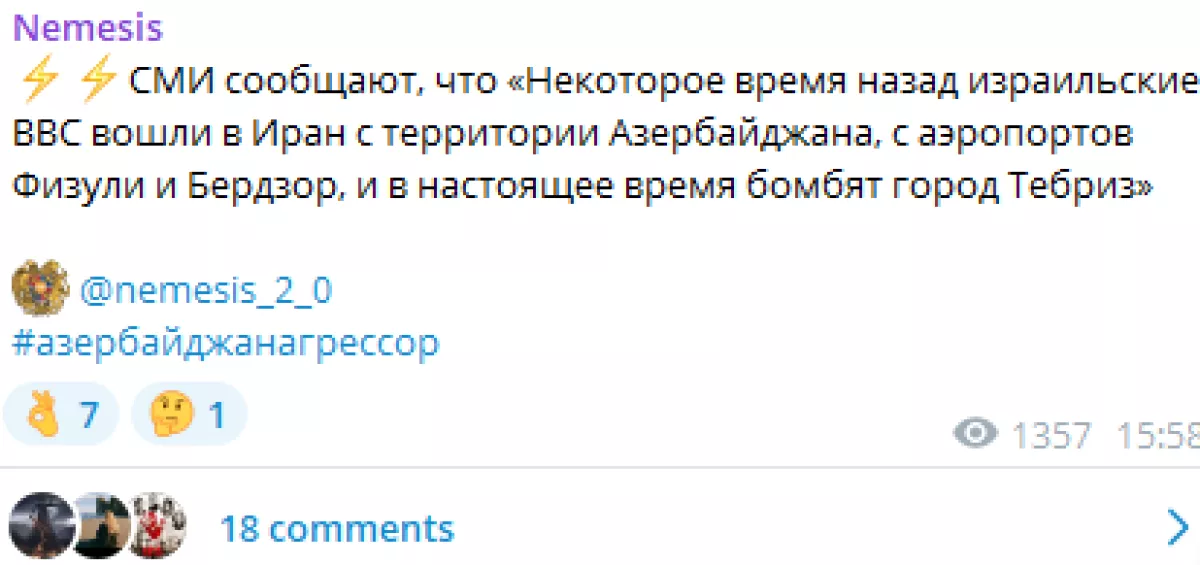Fake on the rise How Azerbaijan is being dragged into someone else’s war
Amid the rapidly escalating military conflict between Israel and Iran, Azerbaijan is demonstrating one of the most balanced and consistent foreign policy approaches in the region. Neither in rhetoric nor in action is there even a trace of the emotionalism so characteristic of many countries. Azerbaijan is not participating in the military confrontation, does not allow its territory to be used for attacks, and is not becoming part of a game whose rules contradict both its national interests and international law.
In line with its commitment to the principles of the UN Charter, respect for the territorial integrity of states, and a policy of good neighbourliness, Baku is calling on the conflicting parties to avoid escalation, refrain from involving third countries in this war, and resolve all issues exclusively through diplomatic means.
This position was once again reaffirmed in today’s statement by the Ministry of Foreign Affairs of Azerbaijan, which expressed serious concern over Israel’s military actions on the territory of the Islamic Republic of Iran. The statement from the Azerbaijani foreign ministry reads:
“We are deeply concerned by the military operation carried out by the State of Israel against the territory of the Islamic Republic of Iran.
While resolutely condemning the escalation of the situation, we urge the parties to resolve their differences through dialogue and diplomatic means, in accordance with the norms and principles of international law.
We particularly emphasize the importance of ensuring the safety of the civilian population and facilities.
It is important to continue contacts through diplomatic channels and efforts within the framework of relevant international mechanisms in order to prevent further escalation of the situation in the Middle East.”

Moreover, as Azerbaijani President Ilham Aliyev has repeatedly emphasised, “Today all of our neighbors are our friends. We enjoy excellent cooperation with all our neighbors, both bilaterally and in a trilateral format.”
“Our policy has always been overt. We have never been a part of an adventure or reckless scheme against any country. I have said that Azerbaijan’s territory would never be used against any country, particularly its neighbors, for launching a provocative action or initiative. And that is how we have gained esteem worldwide, in the region and among our neighbors, and strengthened our country,” President Aliyev noted in his address to the nation in December 2020.

One would think that, after such a clear articulation of its stance by official Baku, all insinuations about the possible use of Azerbaijani territory against neighbouring countries would be put to rest. But that has not been the case.
Following today’s Israeli military strike on Iran, efforts to drag Baku into someone else’s war — even if only in the information sphere — have sharply intensified. In the wake of the attack, several blatant fabrications emerged in Armenian and Russian Telegram channels. The administrators of these channels, closely linked to military propaganda networks and anonymous disinformation operations, spread a false claim alleging that the Azerbaijani Air Force had been scrambled to intercept Iranian missiles and that Israeli aircraft had even entered Iranian airspace from Azerbaijani territory, using airfields in Fuzuli and Lachin.
This disinformation campaign appears to be aimed at a broad, poorly informed audience — one unlikely to question the facts, verify geographical realities, or recognise the basic logical inconsistencies in the narrative.

Such disinformation campaigns, as has often been the case, serve several purposes at once. First, they aim to drive a wedge between Azerbaijan and Iran by exploiting the underlying tensions that have accumulated in recent years. Second, they seek to manipulate public sentiment within Iran, where part of the audience is inclined to view any regional activity as a potential external threat. Third, these fabrications are designed to create a false narrative on the international stage — one suggesting that Azerbaijan is automatically aligning itself with an anti-Iranian alliance and serving as a launchpad for attacks against its neighbour.
None of this bears any relation to reality. Yet it fits squarely within the logic of information warfare, where truth becomes irrelevant, and what matters most is perception and manipulation.
The Azerbaijani side has already responded to these fakes. The Azerbaijan Media Development Agency explicitly pointed out the artificial nature of such reports, emphasising that no Azerbaijani combat aircraft have flown near the Iranian border and that the circulated information is blatantly fabricated. The call to trust only official sources is not merely a formality but a vital necessity in an environment where disinformation factories operate around the clock.
Unfortunately, those who spread such fake news seem to forget that modern international relations are not built on Telegram channel rumors, but on the actions of states, statements from their official bodies, and realpolitik. No country — especially one with the level of maturity and institutional development that contemporary Azerbaijan fully possesses — would engage in the dirty games promoted by third parties. Unlike some of our neighbours, we build our relations with Iran based on open dialogue, sovereign equality, and mutual respect. At the same time, we develop a strategic partnership with Israel, all within the framework of international law and bilateral respect. This is our strength. And this is our position.
Yes, fake news will continue to appear. And we fully understand where it comes from — from those very sources where editing matters more than reality, and hysteria on social media has long replaced institutions of power. But Azerbaijan is not a country where foreign policy is dictated by someone else’s media phobias. Amidst the flood of panic, bitterness, and complexes, Azerbaijan remains firmly on the side of reason and international law. And it is precisely this that ultimately makes us stronger.








